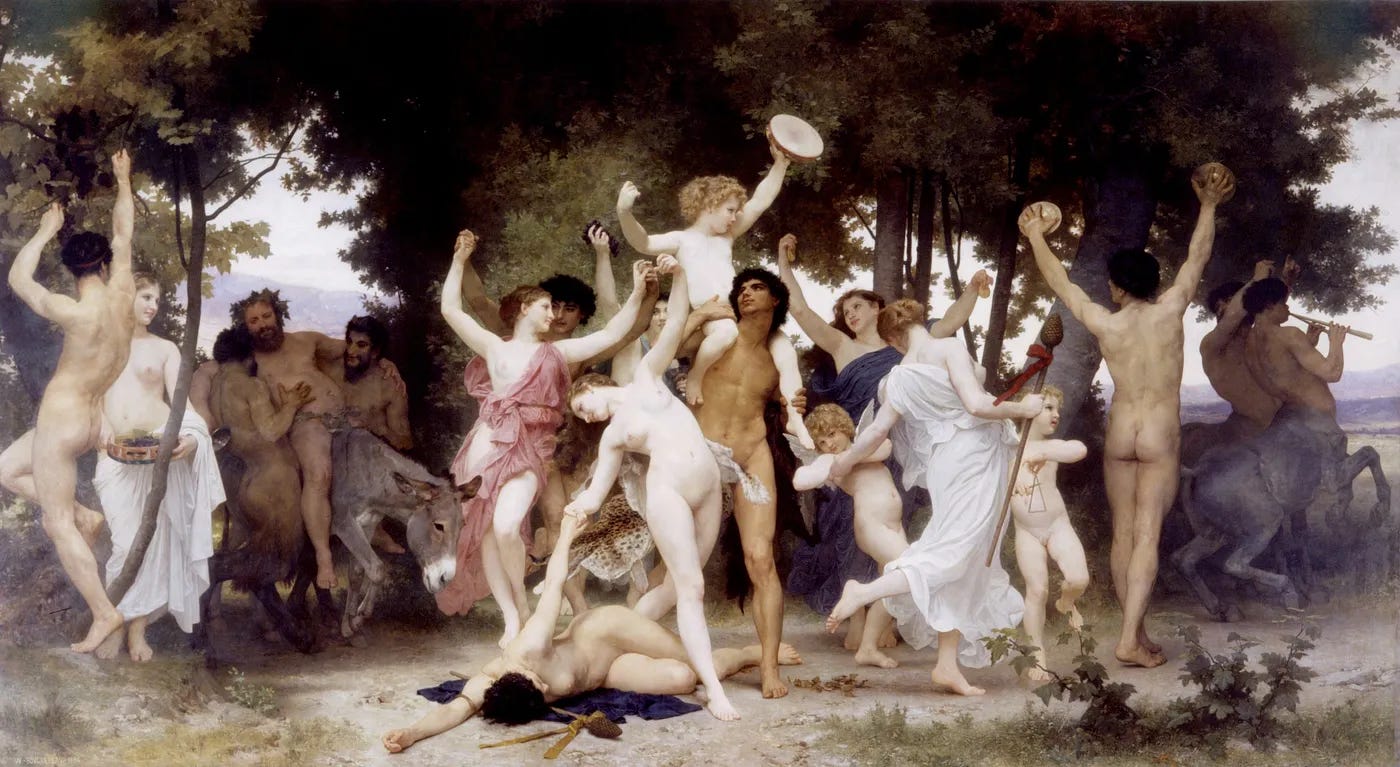The Ancient Greeks warned us about this
What happens when a society forgets its gods and its poetry
Ruach seems to have struck a chord.
A couple of weeks ago, I wrote to you about this ancient Hebrew word, which means wind, breath, and spirit. That week, I’d been knocked flat on my back by one of life’s winds—the kind of turbulence we all meet, all the time. Why do I seem to be so irritatingly sensitive to those winds, I was wondering. Why do I find it so hard to just crack on?
Ruach offers a key. Older cultures, Owen Barfield tells us, languaged the world through words that carried poetic resonance. When you use the same word for wind, breath, and spirit, simply stepping outside the door means encountering god. Everything you do is infused with meaning and with connection between the realms. If you experience the world this way, being sensitive to life’s winds is not just irritating and tiring; it’s also a gift.
Lots of you wrote to me about that idea. About how much space it gave you in your own lives. The breath it helped you to recover. The self-forgiveness. The curiosity. The openness to life as it comes.
It’s not just ancient Hebrew that used to hold deep poetic resonances like this. The resonance is intrinsic to the old-world way of seeing and experiencing life. The Ancient Greeks had a god for everything: for crossing any threshold, for the hearth in your home, for the harvest, for seafaring, for feasting. These gods weren’t abstract figures, over there on the mountain. They were part of the fabric of every day. If you lived in any of the wildly diverse regions and times we now lump together as Ancient Greece, your whole day would have been structured around supplicating and offering rituals to the gods, because you knew your life would fall apart if you didn’t.
And let’s not forget, Ancient Greece is the culture that founded the Western project. The seeds of our present-day democracy were sown there and then, and the gods were an intrinsic part of it.
And not by accident.
When they brought Athena into the heart of their democratic institutions, or held their festivals in honour of Dionysus, the Greeks weren’t simply going through the motions of old belief systems that had dried out or died. Ancient Greek theatre—the stage where dramatists and their audiences worked through the thorny questions that came with advancing civilization—thrums with the fear that the gods will retaliate if humans build a world that forgets to honour them. Just look at Euripides’s The Bacchae, in which Dionysus incites a mother to tear her son limb from limb in an ecstatic frenzy. All this is punishment for the family’s failure to honour the gods.
Two and a half millennia later, as the experiment in democratic civilization that began in Athens seems to crumble, we dismiss all this—the gods, their guidance, their retribution—as make-believe. Rationalist, materialist Western culture closes us off to the dimension of meaning that has made life liveable for every human society in history, until the last few hundred years. And let’s be clear: that includes the society that founded Western democracy, the very society that spawned the way we live. This model was never designed to work without reverence. Without resonance.
When you see it this way, it seems clear that the current amnesia about, even resistance to, realms and beings beyond the material—it’s at the heart of everything that’s wrong in the world today.
But the resonance of other realms and ways of being isn’t entirely lost. It lives on even in the English we speak today, in which the days of the week and the months of the year celebrate the old pagan gods. The words feel dead now because the calendar is nothing but a tool of capitalist productivity—but it doesn’t have to be this way.
How do we re-enchant the everyday world? How do we reclaim the guidance and the meaning that are already right there in our everyday language?
We can start by remembering that the breath is spirit, and the dawn of each Wednesday raises the god of war, heroes, and poets, Woden. That January delivers us to Janus, the god of doorways, and as spring marches in warlike in the year’s third month, it’s led by Mars.
As long as we have language, we have the capacity to live in a world that hums with deeper meaning, and to offer our praise to the gods. And that’s the world I want to go home to.
Love,
xx Ellie




Hi Ellie, I love that you reminded me (us) so wonderful.
.many thanks...Catherine
Ah, Ellie -- this one is so gorgeous!!! Now I want you to give us a post that's nothing but sacred words, like you did at the end! I want them ALL, so I can strew my days with secret god-envelope words, that spill the sacred out! Thanks so much for writing this.